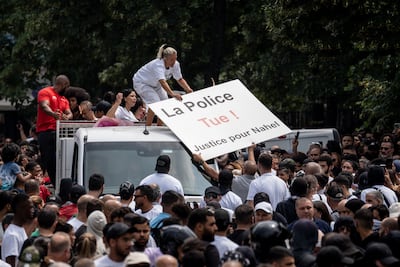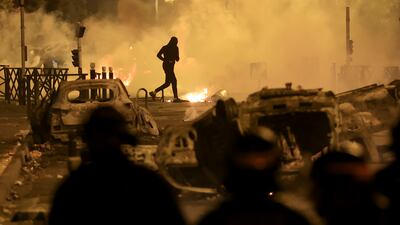Far-right politicians, Islamists and Maoists have little in common on paper. But during the riots in France, they were aligned in their view that Europe is in decline and its establishment elite is to blame.
The police killing of French-Algerian Nahel Merzouk, 17, caused widespread protests, which at their peak led to more than 1,300 arrests in one night. Cars were set on fire and shops looted by rioters.
More than 45,000 police officers were mobilised each night, and armoured cars and helicopters were flown across French cities.
More than 700 people have been sentenced to prison over the riots in fast-track courts, the government said on Wednesday.
The ensuing unrest led to much online commentary – from nationalist political movements to state actors across continents. Troll farms are also suspected to have been involved.
Yet despite their vast differences, they were united in a message of Europe’s downfall.
French President Emmanuel Macron has blamed social media for the riot’s rapid spread. A video leaked to French news channel BFM showed Mr Macron suggesting to French mayors that social media channels could be shut down in periods of unrest.
“When things take off, we need to regulate or cut them off,” he said.
The extent to which platforms fuelled the protests is a matter of debate. France has seen riots like this before, in 2005, after the police killed two teenagers of African descent.
Many say institutionalised racism, France’s marginalisation of its immigrant communities and police violence are at the core of the problem.
The National spoke to experts on Europe, security and online disinformation about this response to the riots.
They revealed how political groups on the fringes, and other nefarious actors, capitalise on Europe’s unrest to push their narrative of western decline.
“When people invoke the name of Europe, they’re talking about big ideological plans, borders, ethnic mixing and who France belongs to,” said Ben Judah, author of This is Europe and a senior fellow at the Atlantic Council.
But this obscures the real issues affecting France's marginalised urban suburbs.
“Nobody talks about the problems of the banlieue, such as poverty, police brutality and youth unemployment,” Mr Judah said.
Part of their ire is directed at Mr Macron, whose leadership is marked by his centrism, support for the EU and his defeat of far-right party leader Marine Le Pen at two elections.
“A lot of people really want and need Macron to fail,” Mr Judah said.
“For those who are committed to a far-right vision of history or a far-left vision of politics, Macron's goal of successfully balancing centrism isn’t allowed.”
Europe’s far-right politicians were quick to blame the riots on immigration. Poland’s nationalist Prime Minister Mateusz Morawiecki tweeted that the scenes in France were “the consequences of the policies of uncontrolled migration”.

The target of his criticism was not the migrants but a more established structure: the EU.
Poland and Hungary had been blocking a new EU migration reform law that was passed in June, which would lead to EU countries sharing their hosting of asylum seekers.
Just days before the riots, representatives from both countries walked out of a European council meeting on migration.
This is an issue that looks beyond the Macron presidency into who governs France next and their stance on migration.
“Marine Le Pen will really benefit from this moment,” said Shahin Vallee, senior fellow at the German Council on Foreign Relations and a former adviser to Mr Macron.
“There hasn't been any polling on the issue yet but there is a real possibility today that she might lead France in the future.
“The riots had a profound effect on public opinion, which has benefitted the right and the far-right. A lot of radicalisation and polarisation emerged out of this moment.”
Amil Khan, founder of Valent Projects, a UK tech start-up that tracks online manipulation and disinformation, and a former associate fellow at Chatham House, said: “Immigrants and Muslims are used by the far-right to push their narrative that societies are failing and there’s moral decline.
“Who do they say is to blame for letting immigrants and Muslims cause the problems they complain about? The liberal elite.”
Far-right figures have already risen from the fringes to have their voices heard in mainstream media and are now able to capitalise on this interest.
This was the case for French economist Jean Messiha, an Egyptian-born Coptic Christian.
When the riots began, Mr Messiha launched an online fundraiser for Florian M, the policeman charged with the murder of Nahel.
Within four days, it had hit €1.5 million ($1.6 million) from 85,083 donations – 10 times the sum donated to the victim’s family.
The fundraiser was part of a messaging tactic – aimed at galvanising support for a wider political cause while using the story of an individual, Mr Khan said.
“Online crowd funding is a new tactic of the far-right. It’s a way of flexing their muscles to say, ‘look at how many people support us’,” he said.
“They are good at linking individual stories to their narrative. It could be a stop and search or a sexual abuse case.”
There are signs that the strategy is effective, as Mr Messiha was invited to speak on French TV about the riots several times. He blamed “lefty-progressive” policies for the unrest.
But the story quickly moved out of France, crossing continents to the echo chambers of North America.
Ezra Levant from the far-right Canadian citizen journalism website Rebel News, travelled to France for a special report titled “France on Fire.” His stated aim was to question Canadian laws on immigration.
“[Prime Minister Justin] Trudeau has recently tripled Canada’s immigration levels. Are there lessons from France we could learn – especially what not to do?” Levant wrote.
Messaging platforms were flooded with videos – the provenance of which could not be traced – of historical speeches pushing an anti-immigration angle.
This included former French President Jacques Chirac in 1991, when he was mayor of Paris, complaining about “the noise and the smell” of the families living in France’s sprawling social housing.
Another showed Moroccan King Hassan II claiming that Moroccans abroad “do not integrate”.
But it is not just the far-right who were watching the French riots closely. In a nebulous online space that purports to be from Detroit and Shanghai, a Twitter user known as Iron Mic blamed the riots on centuries on western colonialism.
“France massacred millions of Africans, looted and pillaged Africa and Asia for its luxurious resources,” they wrote on June 30, the third day of the protests.
“A little property damage and setting a few shopping malls, luxury brand shops and libraries on fire isn’t commensurate payback for brutality, genocide and colonialism.”
For the far-left, the decline of Europe is viewed as the consequence of capitalist societies that have failed to address their colonial history.
The same user hosted a live conversation on Twitter Spaces entitled: “France is Burning and No One Knows Why? Is the West Doomed?”
Political causes regularly unite unlikely partners. Mr Khan described how, in recent months, US right-wing groups had sought to align themselves with “hardline Islamists” over a shared agenda of “conservative social values.”
“They tried to make Islamists into their ‘anti-woke’ allies,” he said. “They want to make out that they together represent 'real people' or the 'silent majority', and that the liberal elite is imposing morally questionable policies on them.”
But unrest in France showed how fragile that alliance was as right-wing activists quickly reverted to anti-immigration and Islamophobic talk.
“Your allies and opponents may quickly change,” Mr Khan said.
Some experts talk of the possible presence of Russian troll farms in amplifying the unrest.
“The initial rioting could have stayed localised and contained, but it quickly spread to a national event,” said security expert Ghanem Nuseibeh, of Cornerstone Global Associates.
“It looks so well co-ordinated and Russia is the only one with capabilities to influence events on such a major national scale. They turned a tragic, local event into a major national crisis within hours.”
France had been the target of Russian troll farms before. They are believed to have amplified the anti-government protests by the Yellow Vests movement.
“The aim is to show that Europe is unstable, there is extremism,” Mr Nuseibeh said. “They want to tarnish the image of the western nation as stable and prosperous.”
Among the tactics of troll farms was using fringe groups.
“They amplify fringe opinions in circles that would create the greatest disruption,” Mr Nuseibeh said. “They will do it on opposing sides to maximise disruption and sow the seeds of discord in society.”
But allegations like this are difficult to prove, he said: “The evidence is circumstantial – social media is key. There is a snowball effect and things take on a life of their own.”
Mr Macron's proposed solution to the issue revealed a blind spot in addressing police brutality in France.
“The fight against police violence has been insufficient,” Mr Vallee said. “The response to the riots was focused on security – an error of analysis which further radicalised the movement.”
Mr Macron's suggestion to “cut out” social media platforms was criticised across the French political spectrum, and prompted comparisons to the authoritarian regimes in North Korea, China and Russia.
“It’s giving up on the idea that democracy is stronger than the tools that are used against it,” said French politician Eric Bothorel, a member of Mr Macron's party.
And should the unrest continue, there is a risk it could turn into votes for French nationalist politicians at the next elections.
“The real path to decline would be if the cycle of riots opens the door to Le Pen,” said Mr Judah. “That would be a serious blow to Europe.”



















